Travel Clinic
 Imperial Pharmacy Sutton, provides a walk in Travel Health Clinic for all your travel needs,
Imperial Pharmacy Sutton, provides a walk in Travel Health Clinic for all your travel needs,
simply visit us in store or call for more information.
 Yellow fever
Yellow fever
Yellow fever is a viral infection commonly found in Africa and South America. 99% of patients typically develop immunity within 1 month of immunisation. Given in a single injection
At least 10 days before travel will allow enough time for the body to develop protection. Protection lasts at least 10 years and provides protection for at least 95% of people who have it.
GET VACCINATED
*some country’s require proof that you have
Malaria
Malaria is spread by the bite of the female anopheline mosquito. Most anopheline species prefer to feed between dusk and dawn which is when most transmission of malaria occurs.
Distribution
Malaria is now predominantly a disease affecting Africa, South and Central America, Asia and the Middle East. Travellers from non endemic countries can contract the disease when visiting these areas and become ill while abroad or present with symptoms on return home. When malaria risk varies within a country, those living in non malarious parts can become infected when travelling to malarious areas. In some malarious areas, for example in parts of southeast Asia, there is a seasonal pattern of transmission. Mosquitoes like a humid atmosphere and breed only in fresh water so their numbers usually increase after periods of heavy rainfall or monsoons.
GET VACCINATED
Japanese Encephalitis
Japanese encephalitis is a viral disease found in East Asia and is most commonly spread by the bit of mosquito. The majority of cases have occurred once the monsoon season is over in China, Myanmar, Thailand, Laos, Cambodia, Vietnam, Nepal, India, Sri Lanka, Indonesia, Singapore and the Philippines.
Vaccination should occur at least 6-8 weeks prior to leaving. The vaccine is currently only available for adults and children over 2 months old. Adults aged 18-65 may be given at an accelerated dose, where by 2 injections are given 7 days apart.
Vaccination should be given 7 days before leaving. Vaccination can last between 12-24 months, where a booster can be given.
GET VACCINATED
Hepatitis A
Hepatitis A is an infection of the liver caused by the hepatitis A virus. The virus itself can be spread by contaminated water and food supplies,particularly shellfish and can also be spread by poor hygiene through person to person contact. Hepatitis a can be found mainly in places with poor sanitation.
Vaccination should be started at least 2-3 weeks before leaving and boosters may be required after 6-12 months if long term protection is needed.
GET VACCINATED
Hepatitis B
Hepatitis B is an acute infection of the liver is most commonly spread through contaminated blood whether it be sexually transmitted or through the sharing of needles, blood transfusions and injections. The most high risk countries include Eastern Europe, India, Africa, Russia, china, south and central America, South East Asia and many of the south pacific islands
Vaccination should be given 2-3 weeks before leaving and extra doses should be given 6-12 months afterwards for long term protection.
GET VACCINATED

Typhoid
Typhoid is an infectious disease caused by salmonella typhi, which causes severe symptoms to the digestive system. The disease is spread by poor hygiene and unsanitary conditions, transferred human to human, via food or in the drinking water.
High risk areas can include the Indian subcontinent, Africa, Europe, the middle east, Africa, south America, central America and the south and south east Asia
In the UK we can offer 2 types of vaccination,
- VI vaccination which is given as a single injection or
-TY21A vaccine, this is given as 3 capsules to be taken on alternative days,
Vaccination should be given at least 1 month before travel, and boosters available every 3 years if you continue to be at risk.
GET VACCINATED
Polio/Tetanus/Diphtheria
Diphtheria is an acute respiratory infection caused by the diphtheria bacterium. The disease has a high mortality rate. High risk places include, India, Nepal, Bangladesh, Indonesia,
Vietnam, Laos, Papua new guinea, sub-Saharan Africa (especially Nigeria), Philippines, Brazil, Iraq and Afghanistan.
The disease is transmitted from droplets from the nose or throat being passed human to human, by kissing coughing or sneezing.
Travel vaccination, a booster can be given (if you have previously had the vaccination as a child)
Note: you should have booster if your last dose was more than 10 years ago.






